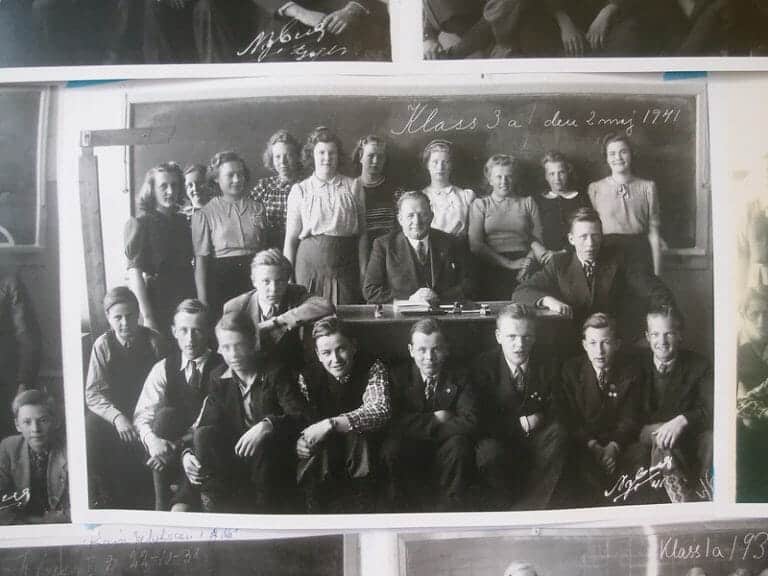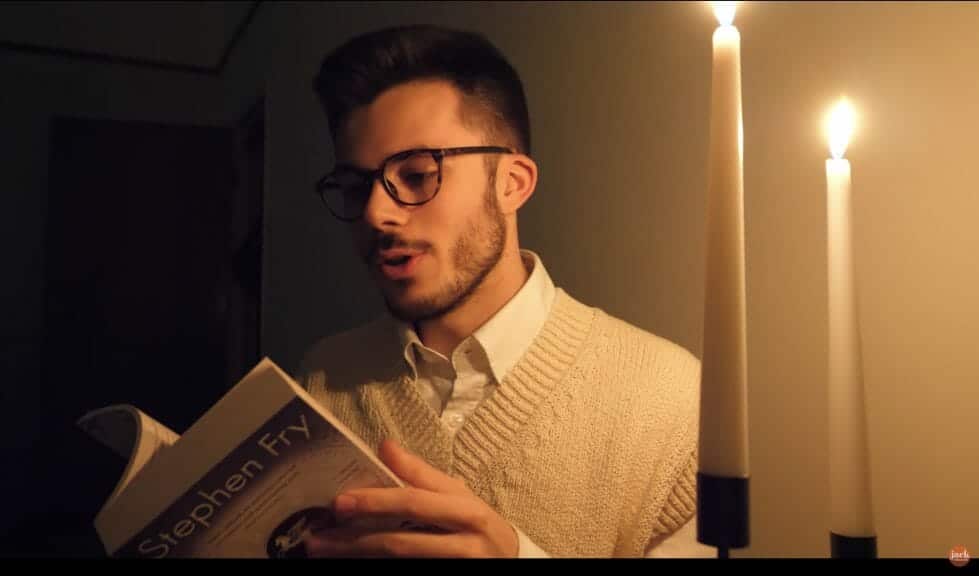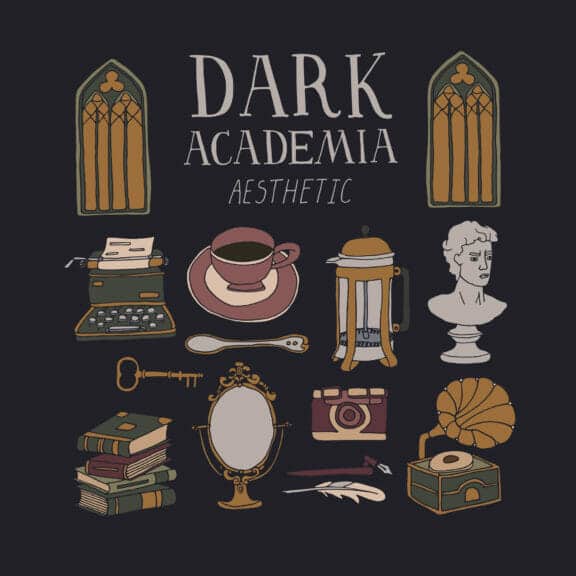The internet aesthetic “dark academia” has been growing for several years now, but never has it been more popular than in the last year. So, what is dark academia, where did it come from, and what does it mean?
What is Dark Academia?
Several tropes are found in books and films that fall under the dark academia genre. Generally, it concerns itself with students in (prestigious) universities, studying Arts subjects such as Ancient Greek, Latin, or “classic” literature. The students often come from affluent, old-money families, and have an intense focus and thirst for learning. A CNN article summarises the dark academic as “smart but sullen, effortlessly cool but largely withdrawn, with rings under their eyes […] and bruised legs”. The plots often revolve around morbid motifs such as murder and mortality. They “subscribe to a dramatic but quite possibly accurate axiom about education: that he who increases knowledge also increases sorrow”.

Donna Tartt’s 1992 book The Secret History is often deemed one of the foundational texts of dark academia. It also gained a large fanbase more recently on BookTok and dark academia-centered social media. Other novels such as If We Were Villains by M.L. Rio is also accepted under the genre title. In film, Dead Poet’s Society (1989) and Kill Your Darlings (2013) fall under the same bracket.
Dark Academia texts often center around something concealed and forbidden. This applies literally, to something like a crime, but also to the act of learning. The Classics students of these elite colleges often pursue learning to its very core. They find philosophical and profound results, generally unknown to the average, more ignorant, person. A Book Riot article accurately states:
“The imposing appearance of these schools helped present higher education as an important, serious, and noble enterprise. What’s more, by disguising their buildings as churches and cathedrals, schools framed the knowledge stored inside their walls as a forbidden fruit, the consumption of which has become a religion unto itself. Indeed, something about the aesthetic is almost blasphemous”.
Adiba Jaigirdar for BookRiot

The Rise of Dark Academia & The Reason for Its Popularity
In an interview with a Masters student, whose research focuses on Gothic Literature, Cian Egan speaks on his ideas about the popularity of the dark academia trend:
“I’ve always held the view that the trend grew out of a kind of deflated romanticism. The reality of college, particularly for arts students, is very different to the fantasy put forward by films, books, and TV shows that are set in elite universities like Oxford, Cambridge, etc. […] Literature and Classics courses are severely undervalued in the modern day because they aren’t deemed economically productive, and this is evident in the relative lack of funding they receive in comparison to other disciplines like business and the sciences. […] so, in affect, the aesthetic attempts to reclaim the importance of the arts and to defy the capitalistic enterprise that the modern university system essentially is.”
This point about the underfunding of Arts and Classics departments reigns true. Last year, the UK cut Arts and Humanities Departments by 50%. Thus, as Egan points out, dark academia provides a world where society deems literature and classics important. One that reclaims education for learning’s sake, rather than for profit.
Several articles highlight the effect of the pandemic as a reason for the growth of the dark academia trend. Following the closure of universities in March 2020, students longed for the traditional academic setting, rather than online classes. Dark academia novels and films provided a level of escapism and indicated what could have been for students.
The Obvious Issue
A valid concern pops up in any discussion about dark academia. Academic institutions have a history of excluding black students and other students of color. Oxbridge and Ivy League colleges traditionally had an overwhelmingly white population and are institutions which still demand high fees from students. Many believe the resurge of interest in dark academia threatens to leave such exclusion unquestioned, and maybe even encouraged.

Today, only 3.5% of UK-domiciled students admitted to Oxford in 2020 self-identify as Black on their UCAS application. This highlights the presence of racial disparity in elite universities that continues unchecked. The high fees of such colleges often exclude working-class students, with students of color frequently caught up within that bracket. However, many authors include a (white) working-class outsider in dark academic texts. For example, in The Secret History the protagonist and narrator’s financial struggle reoccurs throughout the novel. The overwhelmingly male cast of characters so often found in such texts sometimes include one token female character. She is, once again, generally white.
Furthermore, the curriculums of these courses often herald Eurocentric authors. In particular, white male authors such as Lord Byron or Percy Bysshe Shelley, and Ancient Greek male writers. This operates as a key to maintaining white curriculums and excluding important authors of color who so often enrich literature courses.
However, there has been a push recently towards a less white image of dark academia. Novels such as Ace of Spades by Faridah Àbíké-Íyímídé and The Ivies by Alexa Donne (both 2021) have layed significant groundwork for this movement.
Cian Egan finds a new interpretation, as he speaks on the subversion of dark academia to include more POC characters:
“I think it’s akin to the ballroom culture of 1980s New York […] it’s like, by donning the aesthetic of a culture that you have been denied access to, you make a mockery of the illusory boundaries separating you and those who are more privileged than you”
While Egan cautions not to forget that “redistributing privilege through fantasy is simply that: a fantasy”, he also acknowledges that it can be a “powerful tool for breaking down social boundaries”. Nevertheless, characters of color represented in dark academia serve to remind white readers of the space that students of color should take up in elite universities. These characters disrupt the convention of what we believe the Ivies to look like. Novels such as Àbíké-Íyímídé’s also critiques the racism found and upheld in such institutions and within academia.
Dark Academia: An Online Illusion
If you take a scroll through TikTok, Instagram, or Tumblr, and seek out the dark academia hashtag, you’ll find piles of books, candles and caligraphy on wax-sealed envelopes. It looks beautiful, sure, but a disconcerting feeling washes over you. There is a distinct awareness of the filming and photographing of these scenes. The inavoidable knowledge at the back of your mind tells you these objects are props, carefully put into place, down to the positioning of the angled books and how melted the candle is. The facade of dark academia is apparent in every image. It is a thinly veiled illusion. You cannot escape the image in your mind of someone putting this scene together for the sole purpose of making an aesthetic TikTok.
“most often, the dark academic is a TikTok user, emulating a look they have only seen onscreen or in books, and living a version of a dream life in which they can spend their days reading the classics in a centuries-old library.”
“A Guide to ‘dark academia,’ the TikTok poular aesthetic with preppy style and an inntellectual focus”, CNN
A throwaway comment in YouTuber Jack Edwards‘ video on dark academia seemed to sum up this notion: “I put a lot of effort into looking effortless”.

There is a seemingly incompatible nature between filming your reading and reading for reading’s sake, between social media and Ancient Classics.
On this dissonance, Cian Egan notes:
“I think social media can commodify the aesthetic in a way that detaches it from its core ideals […] in saying all that, it wouldn’t exist in the first place without social media, so some of these flaws might well be baked into it innately.”
However, emulating the dark academia aesthetic, and romanticizing your learning serves a distinct purpose. It seems important enough to overrule this dissonance between the trend and its presence on social media:
“I think the aesthetic is at its purest when it functions as an internal fantasy that you use to navigate your experiences as a student. If you’re really struggling with workloads, or maintaining momentum, or any of the things that naturally crop up as you progress through your studies, it can be really helpful to have a romantic conception of your experiences that elevate them beyond the mundanity of everyday life. It makes your hardships feel significant, but also gives them a kind of fictional thematic consistency that real life just doesn’t have. And, at an even more basic level, having a reference point for how you express yourself aesthetically can go a long way in helping you understand how you want to present yourself to the world. “
Cian Egan
All in all, dark academia comes with obvious pros and obvious cons. Behind the popular aesthetic lies layers of cultural context that highlight why it has appealed to so many people.
To read more about aesthetics in studying, read Persephone Kianka’s article on the aesthetic notes that have taken over StudyTube.














